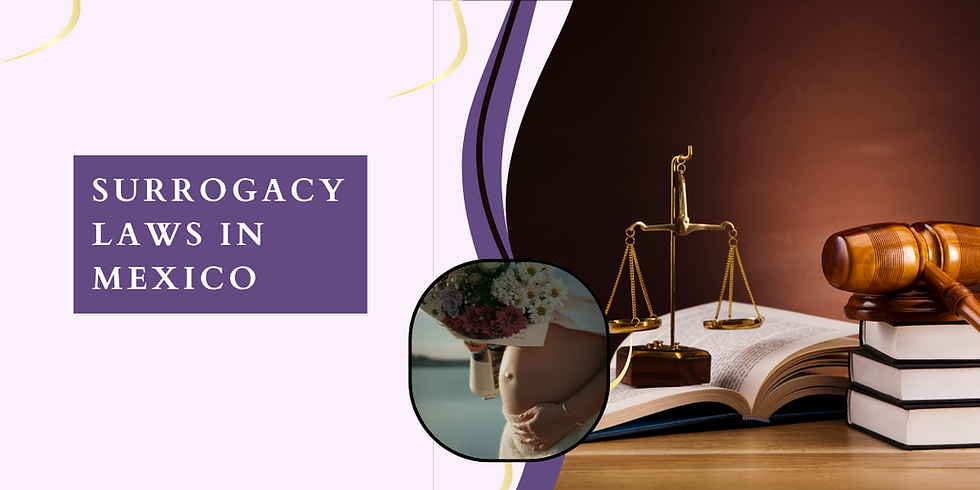Navigating International Surrogacy: Legal Guidance for Families Seeking Support in Mexico
- fertilitysolutions1

- 2 hours ago
- 3 min read
For many couples and individuals, starting a family can be a deeply meaningful yet complex journey. For those exploring international surrogacy, understanding the legal and practical considerations is essential. A well-informed approach ensures that intended parents can pursue parenthood confidently while safeguarding their rights and the welfare of the surrogate. Knowledge of surrogacy laws in Mexico provides clarity and reassurance for families considering this path.
Mexico has become a preferred destination for international surrogacy because of its regulated and structured programs. Beyond the medical procedures, intended parents must consider legal requirements, cultural factors, and emotional aspects of surrogacy. Working with professional guidance can make the process smoother and more supportive, helping families navigate each stage with confidence.

Understanding Surrogacy in Mexico
Surrogacy in Mexico involves a combination of medical, legal, and emotional steps to ensure a safe and positive journey for both the surrogate and intended parents. Key components include:
Screening and matching: Surrogates undergo thorough health, psychological, and background assessments to ensure readiness and suitability.
Medical coordination: IVF and embryo transfer procedures are managed by experienced professionals adhering to international standards.
Legal documentation: Contracts and parental rights agreements are established under Mexican law to protect intended parents and surrogates.
Ongoing support: Agencies provide updates, guidance, and emotional assistance throughout the process.
This structured approach allows families to focus on the joy of creating life while minimizing legal or procedural uncertainties.
International Considerations for Intended Parents
For Canadian families, understanding is surrogacy legal in Canada is crucial when pursuing surrogacy abroad. While Canadian law permits compensated surrogacy to some extent and provides protections for surrogates, intended parents often work with surrogates in other countries due to waiting times or medical availability. Key points for Canadian families include:
Ensuring parental rights are recognized in Canada after the child’s birth
Working with experienced agencies familiar with international legal procedures
Preparing for travel, documentation, and post-birth processes
Considering emotional and psychological support for the intended parents
By understanding both the domestic and international legal landscape, Canadian families can navigate surrogacy confidently while ensuring the well-being of all involved.
Tips for a Smooth Surrogacy Journey
While every surrogacy journey is unique, the following strategies help intended parents have a positive and manageable experience:
Research legal requirements: Understand laws in the country where the surrogate resides and in your home country.
Maintain open communication: Regular updates and discussions with your surrogate foster trust and transparency.
Prepare emotionally: Counseling or peer support groups can help manage expectations and emotions.
Organize logistics: Plan travel, medical appointments, and documentation to reduce stress.
Celebrate milestones: Acknowledge important events like embryo transfer, pregnancy updates, and birth to maintain motivation and positivity.
These practices ensure that families feel empowered and supported throughout the surrogacy process.
Emotional Support and Relationship Building
A successful surrogacy journey involves more than medical and legal processes. Building a positive and respectful relationship with your surrogate enhances the experience for all parties. Agencies can guide families on:
Setting clear expectations for communication and involvement
Offering support and encouragement during the pregnancy
Celebrating milestones together to strengthen trust
Ensuring mutual respect and understanding throughout the journey
These steps create a nurturing environment, benefiting both the intended parents and the surrogate while supporting the well-being of the child.
Advantages of Understanding Legal Frameworks
Being informed about surrogacy regulations provides multiple benefits:
Clarity regarding parental rights and responsibilities
Reduced risk of legal complications during or after pregnancy
Confidence in making decisions regarding medical and emotional care
Access to professional guidance tailored to international surrogacy
Understanding the legal environment allows families to focus on creating a positive and joyful experience rather than navigating uncertainty.
Conclusion
International surrogacy is a hopeful and empowering path for families seeking to build their dreams of parenthood. Knowledge of surrogacy laws for US intended parents ensures that families from the United States can navigate legal, medical, and emotional aspects confidently. With professional guidance and support, intended parents can focus on the joy of welcoming their child while maintaining peace of mind throughout the process. Every family deserves the chance to experience parenthood, and informed, compassionate planning makes the journey smoother, empowering, and truly fulfilling.

Comments